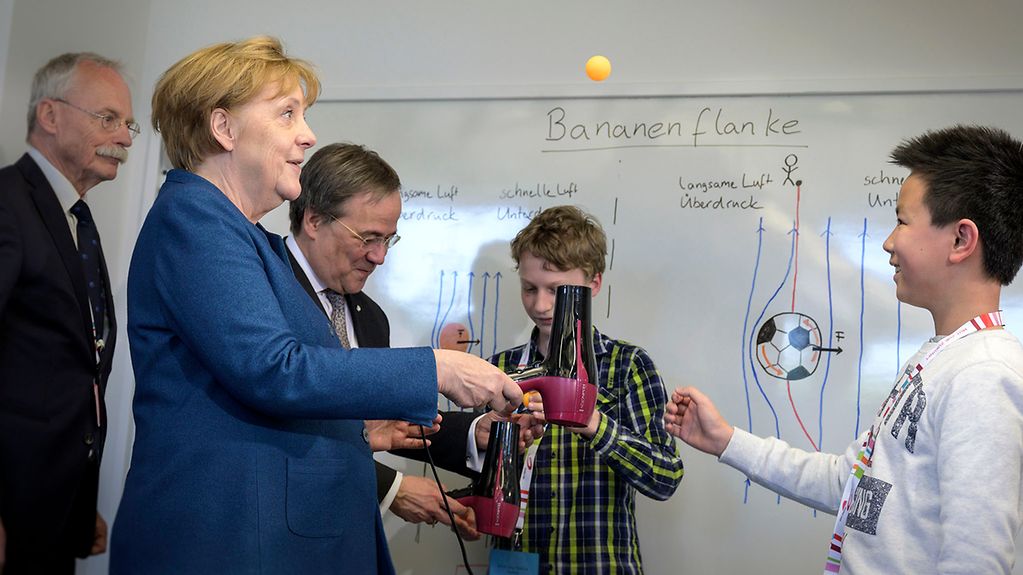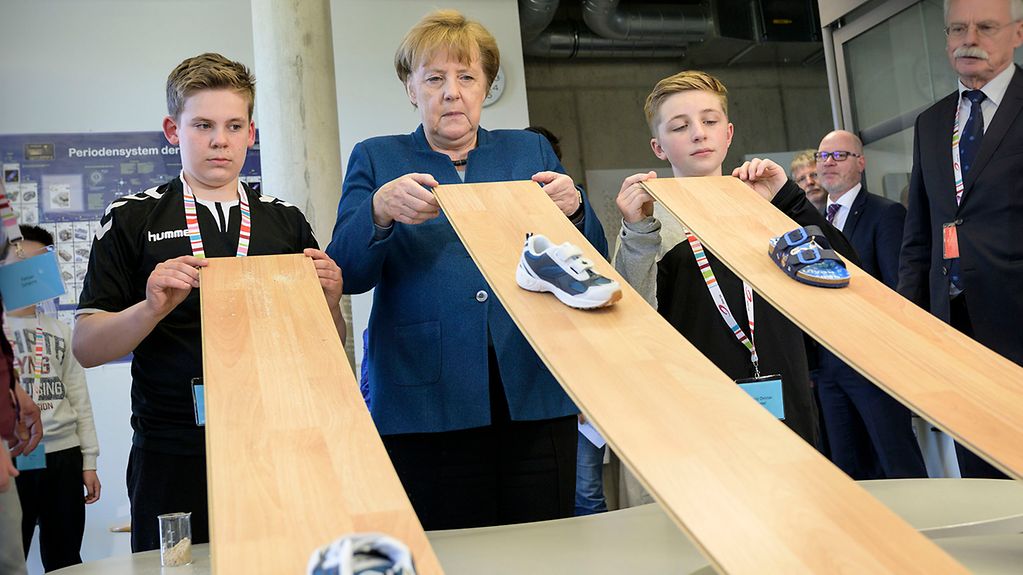A visit to the Junior University in Wuppertal
It is wonderful to see the practical methods being used to bring maths, science and engineering to life so that young people can experience it first hand at Wuppertal’s Junior University said the Chancellor, during a visit. The German government is doing a lot to kindle the enthusiasm of more young people for what are known in German as MINT subjects (mathematics, IT, science and technology).
3 min reading time

Wuppertal's Junior University offers hands-on science in a way that is fun
Photo: Bundesregierung/Bergmann
"Along here Chancellor." Twelve-year-old Elli knows her way round the Junior University in Wuppertal. She has been attending courses here for two years, but today she has a special responsibility. With 15-year-old Vito she is to act as guide for Chancellor Angela Merkel and the state premier of North Rhine-Westphalia Armin Laschet during their visit.
Elli is currently doing a course in dissection. "We cut up animals too. You have to do that in order to understand things properly," explains the schoolgirl. Vito has been attending the Junior University for ten years. "I’ve taken almost 40 courses," he says.
The Junior University in Wuppertal is a non-school learning place open to children and young people between the ages of 4 and 20. It aims to give them a hands-on experience of science, such that they realise that it is fun. The all-year-round courses are unique in Germany in this form. In small groups the children and young people also prepare for competitions such as the German young scientist of the year competition "Jugend forscht", by conducting experiments and testing things on their own. Since it was founded in 2008, more than 65,000 young people have attended the university, which is entirely privately funded.
Hands-on science
Elli and Vito take the Chancellor to a maths course, where a group of four- to six-year-olds conduct an experiment with Angela Merkel. They use a looped cord to make different shapes: a square, a triangle and a circle. Neither the children nor the Chancellor have any difficulties.
The guided tour continues, taking in a speaking robot equipped with sensors. When Angela Merkel strokes his head he giggles loudly. "He is really tickly," calls out one of the spectators.
The impact of physics in sport
Sport and physics are next on the itinerary. The children and young people show the Chancellor what friction has to do with handball. They dampen a long, narrow strip of parquet flooring, to simulate sweat on the floor of a gym. They place a sports shoe on the damp surface and raise one end of the wooden strip slightly – the shoe slides down the slope. Then they repeat the experiment on a dry parquet surface. The shoe only slips down when the slope becomes much steeper this time. "Now I understand why they wipe the floor so often during handball matches," said Angela Merkel.

Get involved - Chancellor Angela Merkel and the young students at the Junior University conduct an experiment together
Photo: Bundesregierung/Bergmann
Fit for research
Although they are so young, Elli and Vito are already quite sure what they want to do in life. Elli is certain that she wants "to study medicine or astrophysics – that’s what really interests me". Vito wants to work as a chemical engineer.
The Chancellor thanks them both for the tour with a smile. Who knows, maybe one day Elli and Vito will meet the Chancellor as a lecturer at the Junior University. In response to the invitation of the Chairman, Professor Ziegler, she certainly said, "Yes, I’d love to come again. Maybe I could give a course with a number puzzle ".
The German government is using a wide variety of approaches to try to encourage more people to engage with the so-called MINT subjects (mathematics, IT, science and technology). The government is, for instance, investing a total of 55 million euros in the MINT action plan for the period up to 2022, in an effort to counter the shortage of skilled workers in these areas. More than 300 partners are involved in the MINT Compact, which is endeavouring to convince young women of the excellent career and earning opportunities in MINT-related professions. And every year the Chancellor hosts a Girls' Day event for schoolgirls, in order to make girls more interested in sciences and technology.